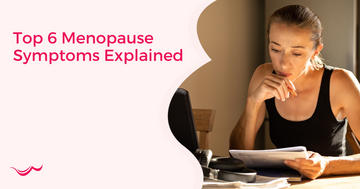
Menopause is a natural phase of life, but it can be challenging to navigate. Understanding what to expect and how to manage symptoms can make this transition smoother.
All of these symptoms are linked to the reduction of hormones - especially oestrogen, but also progesterone and testosterone. Oestrogen plays a role in regulating many functions in your body, from your menstrual cycle to your mood and sleep. When its levels decrease during perimenopause and menopause, it affects both your physical health and emotional well-being.
Understanding these changes can help you navigate this phase more smoothly and find ways to manage the symptoms effectively.
In this blog we're discussing essential topics like symptoms, how to know if you’re in menopause, how long it lasts and key signs to watch for.
How Do I Know If I’m In Menopause?
Menopause doesn’t happen overnight; it’s a gradual process.
The transition into menopause, known as perimenopause, typically begins 8-10 years before, meaning most women will experience perimenopausal symptoms in their 40s. However, it can be as early as mid-30s or as late as mid-50s.
Signs and symptoms of early menopause are varied. The first sign is often a change in your menstrual cycle. Periods may become irregular—either more frequent or less frequent—before stopping altogether. This can last several years before your period stops all together.
You will know you’ve entered menopause when you have had 12 months since your last period. A recent study showed that most women experience menopause itself between the ages of 40 and 58, with the average age being 51.
Testing For Perimenopause and Menopause
If you haven't had a menstrual period for 12 consecutive months, you can speak to your healthcare provider about blood tests to check hormone levels which may provide further clarity. Your doctor can test your FSH and oestradiol on day 2 or 3 of your cycle. Take a further look at testing for perimenopause and menopause here.
How Long Does Menopause Last?
The duration of menopausal symptoms usually lasts around seven years but can last as long as fourteen.
Managing the length and severity of symptoms involves a combination of lifestyle changes and, if necessary, medical intervention. Staying informed about your body and knowing what to expect in perimenopause can help you make the best decisions for your health during this time.
What Are The Signs?
Menopause symptoms can vary widely from one woman to another.
The most common symptoms include hot flushes, night sweats, mood swings, and changes in sleep patterns. These symptoms are often due to the hormonal shifts your body is undergoing, primarily the decline in oestrogen levels.
If you’re experiencing hot flushes, night sweats, and mood changes, and your periods have become irregular, these are strong signs that you’re entering late perimenopause. You may not experience any of these symptoms until you are postmenopausal.
Hot flushes are sudden feelings of warmth that spread over the body, often most intense over the face, neck, and chest. Night sweats are similar but occur during sleep, disrupting your rest. Mood swings can range from mild irritability to more severe emotional fluctuations, impacting your daily interactions. We discuss these in more detail below.
Addressing these symptoms early on can help manage their impact. Even better, you can prepare for menopause years before these symptoms begin. If you're wondering how to treat menopause naturally, lifestyle changes, such as reducing caffeine and alcohol intake, can significantly reduce the intensity of hot flushes and night sweats. Incorporating regular exercise, particularly activities like yoga or walking, has been shown to improve mood and reduce stress, helping to stabilise emotions.
What Happens to Your Mind, Body, and Emotional Well-being During Perimenopause and Menopause? Let's Look at the Symptoms
As you transition through perimenopause and menopause, a variety of physical, emotional, and mental changes take place. These changes are closely tied to the hormonal shifts happening in your body, especially the decline of oestrogen and progesterone. Here's a breakdown of what happens and why.
1. Irregular Periods
As your ovaries start producing less oestrogen and progesterone, which are key hormones in regulating your menstrual cycle, you'll notice changes in your periods. This is one of the first signs of perimenopause. Your periods may become less predictable - sometimes shorter, longer, heavier or lighter. Eventually, as these hormone levels drop further, your periods will stop altogether, marking the official onset of menopause.
This irregularity happens because oestrogen and progesterone play a crucial role in building and shedding the uterine lining each month. When these hormones fluctuate, your body can’t follow the same pattern, which causes the changes in frequency and flow.
2. Hot Flushes and Night Sweats
As your oestrogen levels decrease, it affects the part of your brain responsible for regulating body temperature—your hypothalamus. When oestrogen levels drop, your brain may mistakenly think you're overheating. To cool down, it triggers a rush of heat (a hot flush) and activates your sweat glands (causing night sweats). This is why you might feel fine one moment and then suddenly become flushed and sweaty the next.
This reaction is your body's way of coping with the hormonal changes, but it can feel disruptive and uncomfortable, especially when it happens at night, affecting your sleep.
3. Sleep Disturbances
Sleep is commonly affected by fluctuating oestrogen levels during perimenopause. Both high and low oestrogen can cause disturbances. A decline in oestrogen during menopause can interfere with your ability to fall asleep and stay asleep. Night sweats are one reason - if you're waking up drenched in sweat, it’s hard to get back to sleep. But even without night sweats, lower hormone levels can affect the quality of your sleep, leading to insomnia or fragmented rest.
Oestrogen helps regulate the production of serotonin, a hormone that influences your sleep-wake cycle (did you know that serotonin actually turns into melatonin?). As oestrogen decreases, it can disrupt this cycle, making it harder to achieve restful, uninterrupted sleep.
4. Mood Changes
The drop in oestrogen doesn't just affect your body - it has a strong influence on your mind and emotions. Oestrogen impacts serotonin, the "feel-good" hormone that regulates your mood. As oestrogen levels fluctuate, serotonin can also become unbalanced, leading to mood swings, increased irritability, and sometimes anxiety or sadness.
If you're also dealing with poor sleep or hot flushes, it can create a cycle of emotional stress that makes these mood changes feel even more intense.
5. Vaginal Dryness
Oestrogen is essential for maintaining healthy vaginal tissues. When oestrogen levels decline, the tissues in your vagina can become thinner, drier and less elastic. This can lead to discomfort or pain during everyday activities and especially during intimacy.
This physical change can also affect how you feel emotionally, as discomfort or pain can lead to frustration, avoidance of intimacy or lower confidence.
6. Decreased Libido
A decrease in both oestrogen and testosterone can lower your libido, or sexual desire. Oestrogen keeps vaginal tissues healthy, and when it declines, vaginal dryness can make intimacy uncomfortable. Testosterone, though present in lower amounts in women, also plays a role in sexual desire, and its decrease during menopause can affect how interested you feel in sex.
This is a common experience, but it’s important to remember that these changes are part of the natural process of menopause. Being aware of them can help you find ways to manage both the physical and emotional aspects of a lower libido.
Navigating Menopause and Next Steps
Understanding the signs and symptoms is the first step in managing menopause effectively. While this transition is inevitable, how you experience it can be influenced by the actions you take now. By focusing on lifestyle changes, staying informed and seeking support, you can move towards a more balanced and comfortable experience.
If you’re ready to manage your menopause symptoms, consider exploring natural approaches that align with your body’s needs. Sometimes, small changes can make a big difference.
For instance, our Menopause Day Formula is designed to help support oestrogen hormone levels, relieving those frustrating hot flushes, mood changes, and irritability. It also supports healthy emotional balance and adrenal function, helping your body adapt to stress and maintain a calmer outlook during the day.
If sleep disturbances are your main concern, our Menopause Night Formula can be a game-changer. It promotes restful sleep by reducing the time it takes to fall asleep and soothing those night sweats that can wake you up in the middle of the night. With its support for oestrogen hormone levels, it can help restore balance and ensure you wake up feeling more refreshed.
These formulas are designed to be taken together. We recommend combining our Menopause Day Formula with Menopause Night Formula for comprehensive, day-to-night relief of hot flushes, irritability, night sweats and sleeplessness.
Other considerations:
For those seeking to enhance cognitive function and sexual well-being during menopause, our Mood, Memory & Libido Support formula offers targeted benefits. It helps support healthy sexual function and improve libido, while also enhancing memory, attention span, and cognitive performance, helping you stay sharp and focused.
And if managing stress is your priority, our Stress & Sleep PM Formula is perfect for promoting relaxation and emotional well-being. This formula helps soothe the nervous system, relieve sleeplessness, and reduce symptoms of mild anxiety. It’s a great way to support both your sleep and your body’s ability to handle stress, ensuring you feel more balanced throughout the night.
For extra sleep support, you can combine Stress & Sleep PM Formula with our Calcium & Magnesium Plus K2 & D3 at night to help maintain healthy nervous system function.
By incorporating the right natural support early on, you can improve your experience during perimenopause and menopause and feel more in control of your health and well-being as you navigate this next phase of life.




